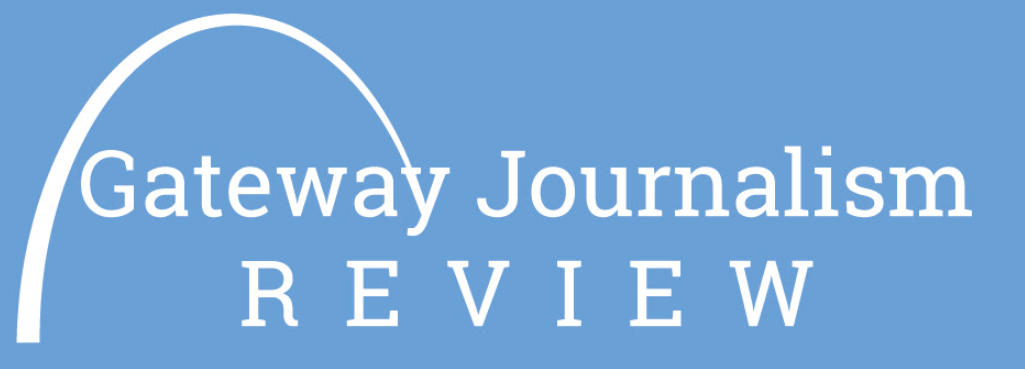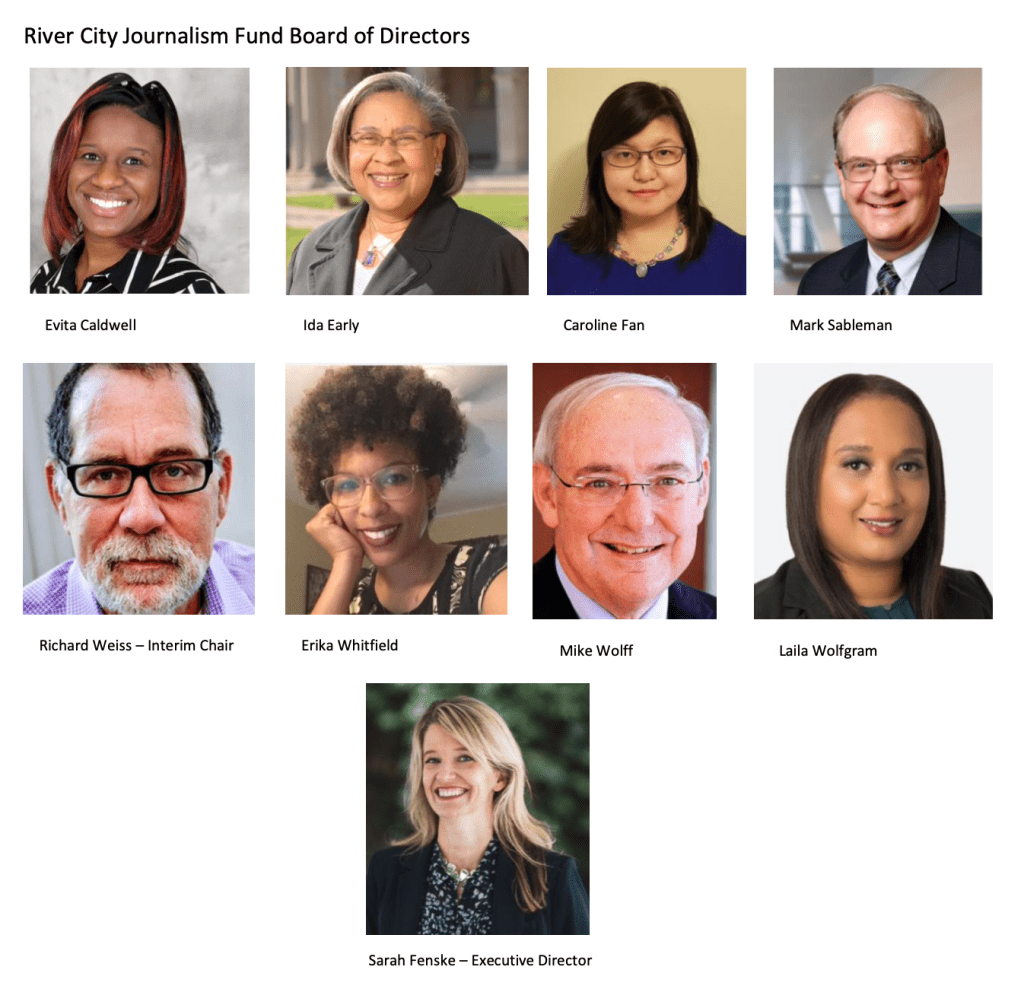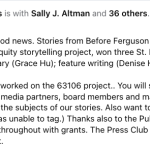
(River City Journalism Fund Note: This is a pre-publication proof of an op-ed prepared for the Gateway Journalism Review.)
Gateway Journalism Review Publisher’s note: At a time when regional newspapers are cutting back and news deserts are emerging across the country, pioneering collaborative journalism efforts are growing up to fill the void.
The Gateway Journalism Review’s September cover story featured collaborative journalism projects across the country that are filling the news void. One was “Solving for Chicago,” a solutions-based collaborative consisting of 20 print, digital and broadcast newsrooms that came together under the management of the non-profit Local Media Association.
Now St. Louis has a new news nonprofit – River City Journalism Fund – born this fall to fund reporting projects that traditional news outlets are having trouble covering.
River City is the idea of two veteran journalists – Sarah Fenske, recently the host of St. Louis on the Air at St. Louis Public Radio and now executive editor of Euclid Media Group and Richard H. Weiss, a former Post-Dispatch editor whose Before Ferguson Beyond Ferguson reporting project grew out of the Ferguson demonstrations that followed the police killing of Michael Brown in 2014.
Endorsing the project is the Pulitzer Center on Crisis Reporting, another organization with deep St. Louis roots. Its executive director is Jon Sawyer, former Washington Bureau Chief of the Post-Dispatch, and its chair is Emily Rauh Pulitzer. The 15-member new board of River City includes a diverse group of St. Louisans known for their good works and acumen.
They are friends and past collaborators of ours at GJR. We asked Fenske and Weiss to explain their project.
–William Freivogel
By Richard H. Weiss and Sarah Fenske
Just over four years ago, Before Ferguson Beyond Ferguson (BFBF), a non-profit racial equity storytelling project, got rolling in St. Louis with a series of in-depth stories about the challenges local African American families have faced over several generations in realizing the American Dream.
Now this fall, with the nation — and the region — facing more challenges than ever and local media hard-pressed to cover them adequately, we want to do more. This month BFBF is announcing a new collaboration, a rebranding and a far more ambitious undertaking under the auspices of the River City Journalism Fund (RCJF). We want to tell you how we came together .
Richard Weiss: Finding Common Ground
I co-founded Before Ferguson Beyond Ferguson with my wife and fellow journalist, Sally J. Altman. Together we recruited a diverse board of 15 civic leaders and stakeholders to guide the work and contracted with more than two-dozen local journalists and specialists to produce the stories.
Civic-minded citizens, the Pulitzer Center and the St. Louis Press Club generously donated to the cause, allowing BFBF to share dozens of stories with media outlets across the region in print, on television, on the air, online and through a variety of social media channels. Our partners included the St. Louis Post-Dispatch, Riverfront Times, St. Louis American, St. Louis Magazine, St. Louis Public Radio, Nine PBS, KMOX, KTRS, the Jewish Light, and Health Progress, a journal of the Catholic Health Association headquartered in St. Louis. A year ago, we also began producing a monthly email newsletter – STL Equity Matters – that is shared with more than 500 subscribers.
Earlier this year, we learned that Euclid Media CEO and Riverfront Times publisher Chris Keating had ideas of his own about building a sustainable model for non-profit journalism. We started talking with Chris, and not long after with Sarah Fenske, who had joined Chris as Euclid Media Group’s executive editor.
Together we fashioned an approach that builds on the racial equity work that BFBF started but adds so much more in terms of broadening the mission and strengthening the revenue model.
So at this point, I’m handing off the narrative to Fenske, who is most familiar with the nuts and bolts of the new operation. But I am not going away and am currently serving as interim chairman of RCJF’s Board of Directors.

Sarah Fenske: Allowing Local Journalism to Thrive in St. Louis
The Riverfront Times came perilously close to shuttering for good in the early days of the pandemic. In March of 2020, the New York Times made the 43-year-old St. Louis paper Exhibit A in its story about how alt-weeklies across the U.S. had been decimated as their longtime advertisers shut down.
Just about every other paper featured in that New York Times story abandoned its print edition. But not the RFT. I can take no credit for this (after four years as the paper’s editor in chief, I’d left prior to the pandemic to host a public radio show), but I still can’t help boasting that they managed not to miss a single issue.
That’s in part because the staff refused to quit, but it’s also because readers stepped up. They valued the paper’s coverage — and they opened their checkbooks. Today the RFT employs more writers and editors than it did before the pandemic. That’s a testament to St. Louis and how it shows up for its institutions, even when those “institutions” enjoy raising hell and dropping the occasional f-bomb.
Seeing that support — as well as the incredible patronage I witnessed during my three years at St. Louis Public Radio — helped me understand that St. Louisans are willing to take action to support local news. And they could be a lifeline for an industry that is still surviving in St. Louis, but needs help to thrive.
That includes the Riverfront Times, but it’s far from just us. St. Louis has a handful of legacy media outlets that have beaten the odds to employ editors and reporters who live here and are invested in this community — but we need support to continue to do meaningful work, to dig deeply into the area’s biggest issues, and to bring up new and diverse voices capable of telling the stories of St. Louis in all its complexity.
At the River City Journalism Fund, we plan to invest in local news on a host of topics — education, the environment, social justice, the business community, the arts and more. At the same time, we will never depart from a core concept: addressing the need for better representation of historically marginalized people in the media.
We’ll do that in three ways:
- Providing grants and stipends to writers in the St. Louis area, giving them the time and resources to tell the stories of St. Louis, and then make their work available for free in at least one local format — in print, online, or through broadcast;
- Making grants to support editorial head-count, paid fellowships and paid internships at media outlets that serve St. Louis, with a focus on journalists from historically marginalized communities;
- Conducting forums to gain a better understanding of the information needs of St. Louis, particularly traditionally under-served communities.
We’re adopting a proven model. Across the country, legacy media are expanding their revenue pools to include philanthropic support. The nonprofit component allows engaged readers to support vital community assets — local independent publications — as they would libraries or museums.
And here’s the key for St. Louis: The River City Journalism Fund won’t compete with existing publications. Instead we will support and advance their work by underwriting ambitious journalism and additional reporting positions, allowing them to do more and do better. Bottom line: More in-depth stories that will help St. Louisans make positive changes in their communities.
With its 63106 Project, Before Ferguson Beyond Ferguson commissioned journalists across the metro to cover a ZIP code in St. Louis that had been largely neglected by local media outlets. The series of stories held up a mirror to St. Louis — and found remarkable buy-in from local media outlets. Just about every publication in town ran at least one of the 63106 Project stories, and readers were the better for it.
Dick and I believe we can expand that model to cover more of these types of important stories, even as we help demonstrate to writers from all backgrounds that St. Louis is a place that will support their work and help them thrive.
Weiss and Fenske: High Value and Low Overhead

The River City Journalism Fund’s grant-making will be guided by our board of directors, a diverse group that includes lawyers, teachers, retired public servants, journalists and communications professionals. By giving their time to run the organization, the board ensures that the vast majority of donations goes directly to local journalism. We intend to hire just one full-time employee, a development director. The board will administer donated funds without additional overhead.
As we seek support for these initiatives, we will continue the STL Equity Matters Newsletter, put the finishing touches on the 63106 Project, and also support Aisha Sultan and her 63106-inspired documentary, Education Interrupted, which will premiere in November at the St. Louis International Film Festival, and will be airing in December on Nine PBS. Next month, we also intend to launch our first project as River City Journalism Fund: a multi-part series that will run in the Riverfront Times and the Jewish Light, as well as potentially one other outlet, and that we hope will make a big splash.
Richard H. Weiss is a former editor at the St. Louis Post-Dispatch and founder of Before Ferguson Beyond Ferguson. Sarah Fenske was editor of the Riverfront Times, host of St. Louis Public Radio and is executive editor of Euclid Media Group with publications extending from the Midwest into Florida. People can directly support enterprising journalism through the River City Journalism Fund.



